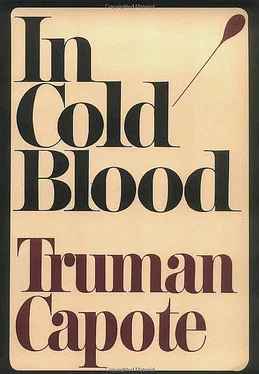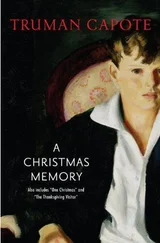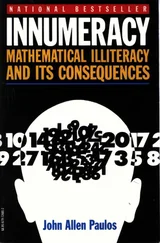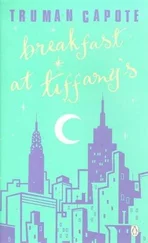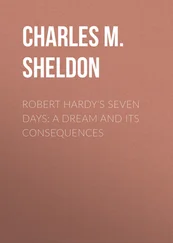The detective leaned the gun against the wall, relinquishing it, although he felt certain it was the weapon that had killed the Clutter family. “Thank you, but it’s late, and I have to drive to Topeka,” he said, and then, consulting his notebook, “Now, I’ll just run through this, see if I have it straight. Perry Smith arrived in Kansas Thursday, the twelfth of November. Your son claimed this person came here to collect a sum of money from a sister residing in Fort Scott. That Saturday the two drove to Fort Scott, where they remained overnight—I assume in the home of the sister?”
Mr. Hickock said, “No. They never could find her. Seems like she’d moved.”
Nye smiled. “Nevertheless, they stayed away overnight. And during the week that followed—that is, from the fifteenth to the twenty-first—Dick continued to see his friend Perry Smith, but otherwise, or as far as you know, he maintained a normal routine, lived at home and reported to work every day. On the twenty-first he disappeared, and so did Perry Smith. And since then you’ve not heard from him? He hasn’t written you?”
“He’s afraid to,” said Mrs. Hickock. “Ashamed and afraid.”
“Ashamed?”
“Of what he’s done. Of how he’s hurt us again. And afraid because he thinks we won’t forgive him. Like we always have. I And will. You have children, Mr. Nye?”
He nodded.
“Then you know how it is.”
“One thing more. Have you any idea, any at all, where your son might have gone?”
“Open a map,” said Mr. Hickock, “Point your finger—maybe that’s it.”
It was late afternoon, and the driver of the car, a middle-aged traveling salesman who shall here be known as Mr. Bell, was tired. He longed to stop for a short nap. However, he was only a hundred miles from his destination—Omaha; Nebraska, the headquarters of the large meat packing company for which he worked. A company rule forbade its salesmen to pick up hitchhikers, but Mr. Bell often disobeyed it, particularly if he was bored and drowsy, so when he saw the two young men standing by the side of the road, he immediately braked his car.
They looked to him like “O.K. boys.” The taller of the two, a wiry type with dirty-blond, crew-cut hair, had an engaging grin and a polite manner, and his partner, the “runty” one, holding a harmonica in his right hand and, in his left, a swollen straw suit-case, seemed “nice enough,” shy but amiable. In any event, Mr. Bell, entirely unaware of his guests’ intentions, which included throttling him with a belt and leaving him, robbed of his car, his money, and his life, concealed in a prairie grave, was glad to have company, somebody to talk to and keep him awake until he arrived at Omaha.
He introduced himself, then asked them their names. The affable young man with whom he was sharing the front seat said his name was Dick. “And that’s Perry,” he said, winking at Perry, who was seated directly behind the driver. “I can ride you boys as far as Omaha.”
Dick said, “Thank you, sir. Omaha’s where we were headed. Hoped we might find some work.”
What kind of work were they hunting? The salesman thought perhaps he could help.
Dick said, “I’m a first-class car painter. Mechanic, too. I’m used to making real money. My buddy and me, we just been down in old Mexico. Our idea was, we wanted to live there. But hell, they won’t pay any wages. Nothing a white man could live off. “Ah, Mexico. Mr. Bell explained that he had honeymooned in Cuernavaca. “We always wanted to go back. But it’s hard to move around when you’ve got five kids.”
Perry, as he later recalled, thought, Five kids—well, too bad. And listening to Dick’s conceited chatter, hearing him start to describe his Mexican “amorous conquests,” he thought how “queer” it was, “egomaniacal.” Imagine going all out to impress a man you were going to kill, a man who wouldn’t be alive ten minutes from now—not if the plan he and Dick had devised went smoothly. And why shouldn’t it? The setup was ideal—exactly what they had been looking for during the three days it had taken them to hitchhike from California to Nevada and across Nevada and Wyoming into Nebraska. Until now, however, a suitable victim had eluded them. Mr. Bell was the first prosperous-seeming solitary traveler to offer them a lift. Their other hosts had been either truck drivers or soldiers—and, once, a pair of Negro prize fighters driving a lavender Cadillac. But Mr. Bell was perfect. Perry felt inside a pocket of the leather windbreaker he was wearing. The pocket bulged with a bottle of Bayer aspirin and with a jagged, fist-size rock wrapped in a yellow cotton cowboy hand-kerchief. He unfastened his belt, a Navajo belt, silver-buckled and studded with turquoise beads; he took it off, flexed it, placed it across his knees. He waited. He watched the Nebraska prairie rolling by, and fooled with his harmonica—made up a tune and played it and waited for Dick to pronounce the agreed-upon signal: “Hey, Perry, pass me a match.” Whereupon Dick was supposed to seize the steering wheel, while Perry, wielding his hand-kerchief-wrapped rock, belabored the salesman’s head—“opened it up.” Later, along some quiet side road, use would be made of the belt with the sky-blue beads.
Meanwhile, Dick and the condemned man were trading dirty jokes. Their laughter irritated Perry; he especially disliked Mr. Bell’s outbursts—hearty barks that sounded very much like the laughter of Tex John Smith, Perry’s father. The memory of his father’s laughter increased his tension; his head hurt, his knees ached. He chewed three aspirin and swallowed them dry. Jesus! He thought he might vomit, or faint; he felt certain he would if Dick delayed “the party” much longer. The light was dimming, the road was straight, with neither house nor human being in view—nothing but land winter-stripped and as somber as sheet iron. Now was the time, now. He stared at Dick, as though to communicate this realization, and a few small signs—a twitching eyelid, a mustache of sweat drops—told him that Dick had already reached the same conclusion.
And yet when Dick next spoke, it was only to launch another joke. “Here’s a riddle. The riddle is: What’s the similarity between a trip to the bathroom and a trip to the cemetery?” He grinned. “Give up?”
“Give up.”
“When you gotta go, you gotta go!”
Mr. Bell barked.
“Hey, Perry, pass me a match.”
But just as Perry raised his hand, and the rock was on the verge of descent, something extraordinary occurred—what Perry later called “a goddam miracle.” The miracle was the sudden appearance of a third hitchhiker, a Negro soldier, for whom the charitable salesman stopped. “Say, that’s pretty cute,” he said as his savior ran toward the car. “When you gotta go, you gotta go!”
December 16, 1959, Las Vegas, Nevada. Age and weather had removed the first letter and the last—an R and an S—thereby coining a somewhat ominous word: OOM. The word, faintly present upon a sun-warped sign, seemed appropriate to the place it publicized, which was, as Harold Nye wrote in his official K.B.I. report, “run-down and shabby, the lowest type of hotel or rooming house.” The report continued: “Until a few years ago (according to information supplied by the Las Vegas police), it was one of the biggest cathouses in the West. Then fire destroyed the main building, and the remaining portion was converted into a cheap-rent rooming house.” The “lobby” was unfurnished, except for a cactus plant six feet tall and a make shift reception desk; it was also uninhabited. The detective clapped his hands. Eventually, a voice, female, but not very feminine, shouted, “I’m coming,” but it was five minutes before the woman appeared. She wore a soiled housecoat and high-heeled gold leather sandals. Curlers pinioned her thinning yellowish hair. Her face was broad, muscular, rouged, powdered. She was carrying a can of Miller High Life beer; she smelled of beer and tobacco and recently applied nail varnish. She was seventy-four years old, but in Nye’s opinion, “looked younger—maybe ten minutes younger.” She stared at him, his trim brown suit, his brown snap brim hat. When he displayed his badge, she was amused; her lips parted, and Nye glimpsed two rows of fake teeth. “Uh-huh. That’s what I figured,” she said. “O.K. Let’s hear it. “He handed her a photograph of Richard Hickock. “Know him?”
Читать дальше
